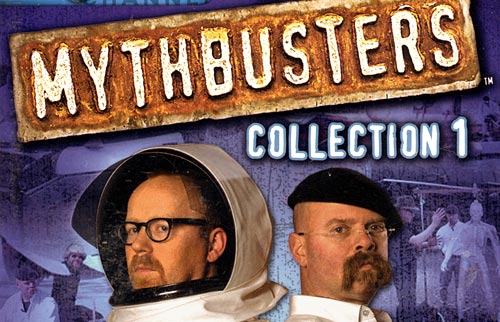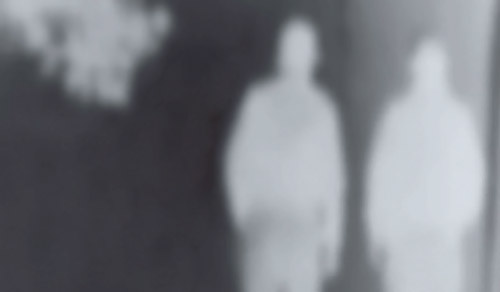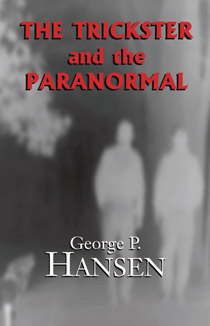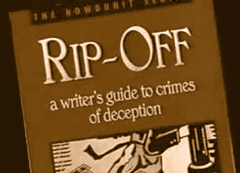
new MythBustersDVD at Shop Skeptic
You can now get 12 episodes from seasons two and three, available for the first time in one four-DVD boxed set. The MythBusters — special effects wizards Jamie Hyneman and Adam Savage, and their sidekicks Kari, Grant, and Tory — test a wild collection of Urban Legends, pseudoscientific beliefs, internet myths and movie folklore, much of it sent in by curious fans. This show is a uniquely valuable tool to teach science, critical thinking and a general kind of how-the-world-really-works knowledge, especially valuable in a time when many people shrug off rigorous research as a waste of time, and are easily taken in by internet rumors. READ more >
In this week’s eSkeptic Robert R. Lavieri reviews George P. Hansen’s book entitled The Trickster and the Paranormal (Xlibris, 2001, ISBN 1401000827).
Robert R. Lavieri is a Percy L. Julian Scholar of chemistry at DePauw University. He is pursuing degrees in biochemistry and philosophy and plans to study pharmacology/biophysics in graduate school. He has studied applied philosophy extensively and, while doing research at Yale University’s Interdisciplinary Center for Bioethics, recently published a paper in the American Journal of Bioethics concerning the disclosure of genetic test results to research participants.

The Trickster and the Paranormal (detail of cover)
A review of
The Trickster and the Paranormal
by Robert R. Lavieri
I approached Hansen’s book with deep feelings of ambivalence and left it in much the same state. The problem is that the paranormal does not exactly lend itself to easy digestion. Hansen is quick to note that parapsychology, the study of extrasensory perception and psychokinesis, is a tiny field. “Only two laboratories in the U.S. employ more than two full-time researchers, and there are probably no more than 10 full-time parapsychologists in the U.S. who conduct research and report it in refereed journals.”
Hansen primarily addresses three issues:
- the controversy over the existence of paranormal phenomena;
- unexpected consequences that may result from attempts to engage in paranormal activities; and
- the relationship between the paranormal and institutions.
Throughout the book Hansen’s thesis is, “that psychic phenomena are associated with processes of destructuring.” The discussions centered on topics 2 and 3 are far more enlightening than the discussion of topic 1. The most salient reason for this is that topics 2 and 3 are logically independent of the existence or nonexistence of paranormal phenomena.
“Tricksters are boundary crossers; they destabilize structures,” Hansen explains. Many, if not all, cultures have trickster characters in their histories. For the Greeks it was Hermes. At least one characteristic of the trickster archetype should be obvious, a propensity for deceit. Tricksters, by definition, violate taboos and break social norms. They often have extravagant, unusual sexual tastes. Tricksters are also marginalized by society; however, to consider them unwilling recipients of discrimination is not altogether fair. Tricksters themselves often do not desire to be a part of the establishment, yet they are often, by their own anti-establishment views, fully embedded in the rich edifice of culture. The most significant generalization that can be made of all tricksters is that they are associated with disorder. The archetype of the trickster has tangible effects in many societies.
After discussing some people who were known as psychics Hansen coldly admits, “the overwhelming majority of the most widely known psychic performers have a reputation for trickery. This is simply a cultural fact.” All of the persons discussed by Hansen fit the trickster archetype. They were alcoholics, unemployed, and often had unusual sexual preferences. Many of these antics no doubt served to generate publicity, and enhance attendance at their shows or events. After all (assuming you are a rock fan), would you be more likely to see a group of wonderful, law abiding citizens sing about their grocery store trips or a group of ragged, wild guys belting out lyrics meant to express their undying love for supermodels and drugs? This type of behavior is of course a double-edged sword. I do not procure my personal guidance from Metallica or White Snake. Likewise, status-conscious scientists often dismiss trickster figures as a silly waste of time.

Hansen suggests that the fundamental differences between scientists and trickster types could be one reason for the lack of serious inquiry into paranormal or supernatural phenomena. He is probably correct, but on a few occasions Hansen makes some unfair accusations about scientists. “Existence of society requires collectively held fundamental premises, beliefs, and assumptions. When they are questioned or challenged, disruption ensues. Western science adheres to the myth of objective reality, but it does not comprehend the foundations of that myth.” First, I would argue that when premises, beliefs, and assumptions are challenged progress, not disruption, ensues. Also, Hansen omitted a necessary caveat about science. Even if objective reality exists, that in no way guarantees our ability to know anything about it. The best example of this is the mind-body problem in philosophy, or more generally the problem of consciousness. Colin McGinn explains in The Mysterious Flame that he is thoroughly convinced we simply are not equipped to be able to answer the mind-body problem. Real science does recognize its own limits, and that is perhaps its most important task.
Later, Hansen appears to unfairly criticize science again with reference to the relationship between the paranormal and institutions. He writes, “probing foundations and questioning basic assumptions are the beginnings of liminal conditions… The primitives understood that; most academics do not.” Probing foundations and questioning the most basic assumptions are the hallmarks of great science. Science is filled with uncertainty, mystery, and adventure. It seems in many cases that Hansen is working a bit too hard to make science appear like the big, evil, straight-laced establishment that is out to squash inquiry. However, some of his complaints against academe are rooted in legitimate concern.
Hansen reports there is not a single existing parapsychology department in any University. Even after reading this book I am not so sure that we would be better off if we did have parapsychology departments. He does have a legitimate concern about the lack of scholars available, but then again there is another side to the coin. Clearly, we do have psychology departments and, if need be, they can certainly investigate paranormal phenomena. Hansen even admits that some psychology departments do conduct research on paranormal phenomena. Perhaps one of the failings of this book is that, after I read it, I am left with the feeling that we should not be devoting more resources to studying paranormal phenomena.
In his concluding words Hansen again misrepresents science. He writes, “the dominant cultural myth now is that the world can be entirely grasped by rational means; any exceptions are considered trivial.” Either Hansen is referring to western culture as a whole or he is referring to scientists alone. If the former, he is wrong. More people than ever believe in some kind of supernatural being, God, etc. These people think that there are sacred mysteries we cannot grasp. It seems, however, he is referring to scientists, because he later writes, “this goes almost completely unquestioned, particularly within science.” Wrong! I used the mind-body problem as an example of a philosophical problem, because we have acknowledged that science can do nothing to help resolve it. Thus, under either interpretation Hansen’s statement, “the dominant cultural myth now is that the world can be entirely grasped by rational means” appears to be incorrect. Again, Hansen’s statement is by no means the dominant belief held by either religious or nonreligious people.
Given the current intellectual climate in the U.S. today I am quite sure we ought not be concerned about becoming too rational. Given the number of people who believe in the existence of a supernatural supreme being who simultaneously do not believe in evolution I think we are pretty far from becoming a country where rationality reigns supreme. Hansen and I both properly acknowledge that our ability to acquire knowledge via science is quite limited. My answer, and the answer of many others, is that when we are unable to gain knowledge via the scientific method the correct action is simply to admit that we are unable to gain knowledge via the scientific method. Hansen’s answer is that we ought to somehow continue to investigate phenomena that are beyond the realm of rationality. I stare into the abyss and see nothing, because it is of course an abyss. For me, the discussion ends then and there.

lecture reminder
The Stuff of Thought:
Language as a Window into Human Nature
with Dr. Steven Pinker
Sunday, September 30th, 2pm
Beckman Auditorium, Caltech
One of the most influential thinkers of our time, Dr. Steven Pinker marries two of the subjects he knows best — language and human nature — into his new book on how words can help explain our nature…

Con Games, Part 1
The art of the con is as old as civilization, employing the skills of deception, misdirection, and the psychology of human greed and the desire to get something for nothing. In this episode, Shermer employs a professional con artist to teach him the fine art of conning people.









